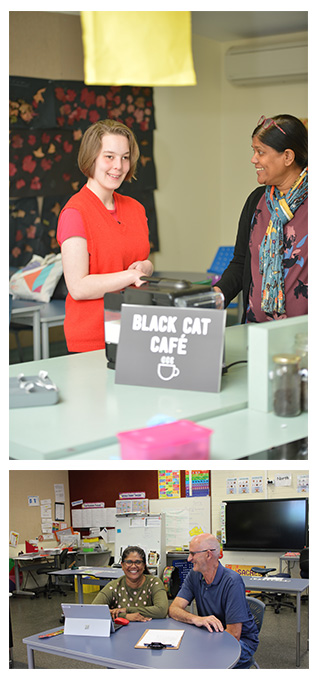Home >
News and Events >
2020 >
October >
Specialist teaching – the best gig
5 October 2020
 Friday 30 October is World Teachers Day (Australia). Much-loved specialist teacher Hygenia Lobo has taught at St Paul’s College, Balwyn, for 21 years. She shares with us her insights on what being a teacher means to her.
Friday 30 October is World Teachers Day (Australia). Much-loved specialist teacher Hygenia Lobo has taught at St Paul’s College, Balwyn, for 21 years. She shares with us her insights on what being a teacher means to her.
Specialist teaching
Specialist teaching is the best teaching gig and I would not swap it for anything. I’ve been teaching at St Paul’s College for 21 years and have learned so much from my students over that time; they’ve taught me to see the world through their eyes and nothing gives me more joy than to celebrate all their achievements – big or small. The biggest plus is the rapport you build with your students and families along the way. At the same time, being a special education teacher has its challenges. Teachers have to wear many hats and navigate the pressures of each day, especially when there is a shortage of staff, because special education is ‘hands on’.
Teaching teenagers
I believe when a child turns 14 or 15 their Individual Learning Plan should reflect goals that prepare them for life after school. At St Paul’s, the emphasis is on being realistic and taking into account the needs, preferences and strengths of our students in a meaningful way. In secondary school we connect academic skills with living skills and real-life experiences. We also integrate school-based enterprises within the school community, for example our Black Cat Café, where students develop essential life skills to pave the way for their future employment and independence.
Working with families
It’s very important to have a partnership with parents right from the get-go. Their input is valuable and, when decisions are made collaboratively, everyone is invested and there is a mutual commitment which involves the parents and school staff.
NDIS impacts
Since the introduction of the NDIS much has changed. It’s great when we hear about a good outcome for our students and families, but is very disheartening when we hear how some of our parents feel stranded when their NDIS funding is minimal and the evaluations do not reflect the funding required for their child’s overall quality of life post-school. I think more needs to be done about information and procedures around services and funding. For example, NDIS funding information nights, disability expos and disability events in Melbourne.
Life beyond school for young people with disability
Depending on the need and preference of the student and choices made by parents, life after graduating can involve attending day programs or individualised programs with paid supported employment thrown in the mix. However, finding the right program can become a stressful experience for our parents, as some of the options available are limited and the services may not cater to their child’s needs.
Graduation
It’s bittersweet and a very emotional day. Seeing students through to graduation is a team effort and it involve teachers, learning support and allied health staff nurturing them over the years. It makes us all very proud of their achievements and to see how far they have come.
What makes your school so unique?
I work with an amazing group of people, especially our learning support staff who are dedicated and want the best for our students. As professionals we are headstrong for our students and constantly advocate for them. I have made some very close friends in my 21 years who have influenced and taught me so much along the way. I love being part of the St Paul’s team; it’s a pretty special place to be.
What do you enjoy about working for a Catholic school?
I am surrounded by plenty of goodwill, understanding and compassion. I am reminded and given the opportunity every day to practise and live my faith. I love the fact it allows me to keep my spiritual connection constant.